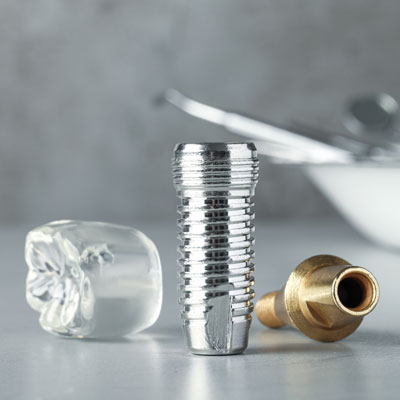NEWS + ARTICLES
What are Dental Implants Made of? Choosing the Best Material for Your Teeth
Have you ever wondered what those excellent dental implants are made of? At Restoration Dental OC, we have over 8 years of experience. We have restored over 2,000 perfect smiles with dental implant surgery. They’re genuinely a game changer!
In this guide, we’re taking a deep dive into the world of dental materials and implants. We’ll help you uncover the secrets behind these wonders.
Factors to Consider When Choosing an Implant Material
1. Getting Along with Your Body (Biocompatibility)
The implant material needs to be friendly with your jawbone and gums. This helps it feel comfortable and stay healthy for many years. Think of it like finding the perfect puzzle piece that fits just right!
Examples: Titanium and zirconia are popular choices because they’re known to get along well with the body.
2. Built to Last (Strength and Durability)
A strong, durable material will ensure your implant lasts long. Think of it like choosing a sturdy chair you can sit on daily without breaking it.
3. Looking Good (Aesthetics)
If your implant is in a spot that shows when you smile, you’ll want a material that blends in naturally with your other teeth. This can help you feel confident about your smile.
Imagine: A material that matches the color of your teeth so it looks like it’s always been there.
4. What Matters to You (Individual Preferences)
You might have certain preferences or needs when it comes to materials. It’s important to talk to the dentist about these.
For example, Some people may have allergies to certain metals or prefer materials that are known for being extra gentle on gums.
5. Keeping Costs in Check
Implant materials come with different price tags. We can help you find options that fit your budget without sacrificing quality. It’s similar to choosing a car – many excellent options are available at various price points.”
Don’t hesitate to ask our dentist lots of questions! We are the best team to help you choose the perfect material for your needs.
The Standard for Titanium Dental Implants

Pros of Titanium Implants
- Strong and Long-lasting: Titanium is super strong. This means it can handle all the chewing and biting you do daily.
- Body-Friendly: Titanium gets along well with your gums and bones, so your body usually accepts it without any problems.
- Fuses with Your Jaw: Titanium actually bonds with your jawbone, kind of like it becomes part of you! This makes it really stable and secure.
- High Success: Studies show that titanium dental implants have a high success rate. It is often over 90% after 10 years.
- Bends a Little: Titanium has some give to it, so it can handle pressure and last longer.
- Safe for MRIs: You won’t have any problems if you need an MRI scan. However, It can sometimes cause minor distortions in the images.
- Easier on the Wallet: Titanium implants usually cost less than other types, like zirconia.
Cons of Titanium Implants
- Might Show Through Gums: If your gums are thin, you might see a little bit of the metal color.
- Rare Allergies: A few people are allergic to titanium, but it’s uncommon.
- Tiny Chance of Corrosion: Over a long time, there’s a small chance the implant could corrode a little.
- Can Affect MRI Images: Titanium implants might make MRI images a bit blurry, but usually not much.
- Surgery Risks: Like any surgery, there are some risks, such as infection.
See more: How long do dental implants last? Guidance from experts
Alternative Materials for Dental Implants
Zirconia dental implants
Zirconia dental implants have emerged as a popular alternative to titanium implants.
Pros:
Look like natural tooth roots: Zirconia is white like your real teeth, so it blends beautifully.
Plays well with your body: It’s unlikely to cause any reactions or allergies.
Happy gums: Zirconia can actually help keep your gums healthy.
No rust: Unlike metal implants, zirconia won’t corrode.
Good for sensitive teeth: It doesn’t conduct heat well, so you’re less likely to feel that jolt from hot or cold foods.
Cons:
Can be fragile: Zirconia can break more easily than traditional metal implants, especially if you clench or grind your teeth.
Newer to the scene: We don’t have as much long-term data on zirconia as we do on metal implants.
Pricey: Zirconia implants often cost more.
May weaken over time: There’s a chance zirconia can become weaker over many years.
Can chip: The porcelain on top of the implant might chip.
Sensitive to some chemicals: Zirconia can react to certain chemicals.
Fewer size choices: Your dentist may have fewer options to choose from with zirconia.
Proportion: Some studies suggest zirconia implants may have lower success rates than titanium.
Compare titanium alloys and zirconia implants
Feature | Titanium | Zirconia |
Material | Metal | Ceramic |
Color | Gray | White |
Aesthetics | It may show through gums | Natural tooth-like color |
Allergy Potential | Rare | Very rare |
Corrosion | No corrosion | No corrosion |
Proportion | 95% after 10 years | 87% to 100% |
Vs. Ceramic
Factor | Titanium | Ceramic |
Biocompatibility | High | High |
Cost | Lower | High |
Aesthetics | Grayish color may show through thin gums. | White color closely resembles natural teeth |
Longevity | Can last 25 years or more | Can last 10-20 years or more |
Allergies | Potential for allergic reactions in rare cases | Hypoallergenic, suitable for metal allergies |
Vs. Polymers
Feature | Polymers | Titanium |
Biocompatibility | Excellent | Excellent |
Resorbability | Yes | No |
Strength | Lower | High |
Durability | Good | Excellent |
Osseointegration | This can occur with surface modifications | Excellent |
Esthetics | It can be more natural-looking | It may show through thin gums |
Cost | Lower | High |
Long-Term Data | Limited | Extensive |
Vs. Gold
Feature | Gold | Titanium |
Corrosion Resistance | High | High |
Strength | Moderate | High |
Weight | Heavy | Lightweight |
Aesthetics | Distinct gold color | Grayish color |
Cost | Expensive | More affordable |
Osseointegration | Less common | Excellent |
Longevity | Potentially long-lasting | Long-lasting (30+ years) |
Allergies | Rare | Rare |
What Does the Dental Implant Process Involve?
Embarking on your dental procedure journey is an exciting step toward a restored smile! Here’s what you can expect:
Initial Assessment: Our dentist will check your oral health. This includes assessing your jawbone density and gum health. We will also check if you are suitable for implants. This often involves X-rays or 3D scans.
Treatment Planning: We will create a personalized plan that addresses your needs. This may include steps like tooth removal or bone grafting if necessary.
Dental Implant Placement: Under anesthesia, the surgeon places a titanium implant post into your jawbone.
Healing and Osseointegration: This phase is crucial and can take several months. During this time, the implant fuses with the bone, providing a solid base for your new tooth.
Attaching the Abutment: After the implant heals, the dentist attaches a small connector called an implant abutment. Then, your custom crown is attached to restore your smile.
Ongoing Support: Our dental team is here to guide and support you every step of the way. We are committed to your comfort and the best outcomes.
The Future of Getting Dental Implants
Are you considering tooth implants? Or do you want to learn more about this option for replacing missing teeth? There are several key topics to explore.
1. Graphene Nanocomposites
Imagine a dental implant that’s both incredibly strong and flexible! Graphene is a super-thin material made of carbon. It is combined with other materials to create just that.
These “graphene nanocomposites” can resist daily biting and chewing. They will make your implants more durable.
2. Bioactive Materials
These special materials help your jawbone bond with the implant. The result is a faster, stronger connection.
Think of them as giving your bone a helping hand to accept the implant as part of you. Bioactive glass and hydroxyapatite coatings are two examples of this exciting technology.
3. Innovative Materials
This category includes some truly cutting-edge developments:
Smart Implants: These implants have tiny sensors that monitor how well you’re healing. It’s like having a little checkup crew right there in your mouth! This allows dentists to catch any problems early on and provide the best possible care.
Bioresorbable Materials: These implants are designed to dissolve over time, leaving only your bone. It’s like they’re paving the way for your body to take over and heal completely naturally.
Roxolid: This newer material blends titanium and zirconium, making it extra strong and body-friendly. It’s designed to be even better than titanium alone!
Imagine implants that promote bone growth. They also accelerate healing and further cut complications. The potential advancements are inspiring!
The future of dental implants is bright. These innovations promise to change how we restore smiles. They are creating even more comfortable, natural, and long-lasting solutions.
Best dental implant dentistry in Orange, CA.
Dental implants have changed how we approach tooth replacement solutions. They offer an efficient, safe, and natural-looking fix for missing teeth.
At Restoration Dental OC, we are passionate about providing the best dental implant care in Orange, CA. Here’s what sets us apart:
Dental professional team: Our dentists have successfully placed many implants. So, you can trust you’re in good hands.
Latest technology: We use the best implant materials and techniques for optimal results.
Personalized care: We will take the time to understand your needs. Then, we will create the right treatment plan for you.
Frequently Asked Questions
What are the best materials for dental crowns?
The best dental crown material depends on your needs and preferences. Zirconia and porcelain-fused-to-metal are two top choices.
What are the most common types of dental implant materials?
Titanium and zirconia are the most common materials used for dental implants. Titanium is strong and biocompatible, while zirconia looks like natural teeth.
Are there different grades of titanium used in dental implants?
Yes, implants are made of commercially pure titanium and titanium alloys. These have different strengths and biocompatibilities.
What part of a dental implant is made of titanium?
The implant post, which is placed into the jawbone, is mainly made of titanium. This post acts as the artificial root for the replacement tooth.

Dr. Ronald Pham, DDS, is a Doctor of Dental Surgery who graduated from the USC Ostrow School of Dentistry in 2015. With over 8 years of experience in restorative dentistry, including dental implants, crowns, bridges, fillings, root canals…
Dr. Pham has restored the smiles of +2,000 patients and is committed to providing professional dental care focused on patient comfort. He achieves this by combining a welcoming space and state-of-the-art dental technology.

Guaranteed Smiles!
As a premiere dentist office in Orange CA, we will always make sure that your experience is memorable, friendly, and professional. We strive to meet your highest expectations in every way imaginable, from your very first interaction with our office staff, to the quality of treatment you receive. We don’t take our patients’ trust for granted, and will promise to over-deliver with your best interest in mind. So give us a call today, and experience our first-class service!
Insurance
Accepted
We proudly accept most dental insurance plans, and welcome cash patients as well. Call us today for more information.
$199
Special
New to our dental office? Take advantage of our New Patient special offer with x-rays, exam, and full report of findings.
Extended
Hours
Do you have an emergency? Need to see us a little later or earlier? Let us know. We can be flexible to meet your busy schedule!
